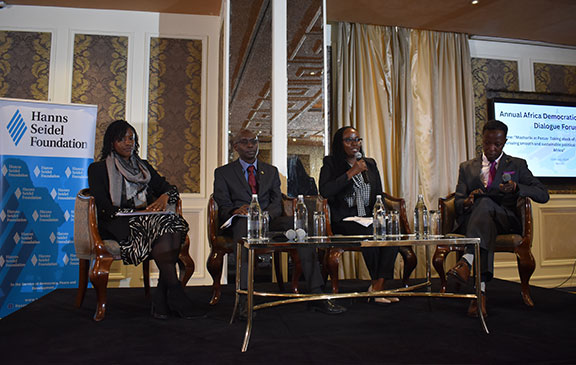In an era where political transitions play a decisive role in shaping the futures of nations, the need for sustained efforts towards ensuring smooth transitions has never been more crucial. On July 10, 2024, the Hanns Seidel Foundation (HSF) and Strathmore Law School co-hosted the Annual Democratic Transitions Dialogue Forum in Nairobi, under the theme “Mashariki in Focus: Taking Stock of Gains and Challenges in Pursuing Smooth and Sustainable Political Transitions in Eastern Africa.”
The Forum brought together a diverse group of stakeholders, including representatives from regional bodies, governments, academia, civil society, and the international community, all unified by a shared objective: to forge a pathway for stable political transitions in Eastern Africa. The Forum’s goals were threefold: to provide an overview and analysis of regional stability, to foster knowledge exchange among key stakeholders, and to present findings from the report on political transitions in the Democratic Republic of Congo (DRC).
Throughout the discussions, the importance of smooth political transitions for regional stability and growth was clearly highlighted. The event underscored the power of dialogue and collaboration in addressing challenges and seizing opportunities within Eastern Africa’s political landscape. Distinguished speakers from the Kenyan government, the African Union, the East African Community, and academia drew from their expertise and experiences, contributing valuable insights and fostering deeper conversations around the region’s political transitions.
Dr. Korir Sing’Oei, CBS, Principal Secretary of the State Department for Foreign Affairs, delivered a keynote address via video, emphasizing Nairobi’s central role in promoting regional stability through multilateral processes. Among these include the EAC-led Nairobi Process, a regional peace initiative aimed at resolving the conflict in the Eastern Democratic Republic of Congo (DRC); Tumaini Initiative High-level Mediation for South Sudan; and the AU High-Level Panel for the Ethiopian Peace Process/ the Permanent Cessation of Hostilities Agreement (CoHA) in Ethiopia.
Meanwhile, Amb. Salah Hammad, Head of the AGA-APSA Secretariat at the African Union Commission, addressed the Forum virtually, elaborating on the African Union’s strategies to address political transition challenges. He called for further exploration of political transitions through case studies such as Sudan’s, to draw meaningful lessons for the region.
Mr. Julius M. Mbati, Police Liaison Officer and the Designate Coordinator of the Political Federation at the East African Community (EAC), discussed EAC’s efforts to strengthen regional stability, identifying the successes, obstacles, and the ways member states and international partners could bolster these initiatives.
Fostering Sustainable Political Transitions in Eastern Africa: Insights from the 2024 Democratic Transitions Dialogue Forum
Article Summary:
The Forum’s goals were threefold: to provide an overview and analysis of regional stability, to foster knowledge exchange among key stakeholders, and to present findings from the report on political transitions in the Democratic Republic of Congo (DRC).
Download
Experts panel discussion. From left to right: Ms. Mukami Wangai, Strathmore Law School; Mr. Julius Mbati, EAC; Dr. Mercy Kaburu, USIU-Africa and Mr. Robertson Kabucho, HSF
Dr. Mercy Kaburu, Assistant Professor of International Relations at USIU-Africa, provided an insightful scholarly evaluation of current interventions aimed at promoting stability in Eastern Africa. She reflected on the achievements of the past decade, the persistent challenges, and offered recommendations for how democratic governance can be further strengthened to support effective political transitions.
The launch of the report, “Democratic Transitions in Africa: A Case Study on the Political Transition in the DRC,” was a key moment of the Forum. Presented by Ms. Mukami Wangai, Doctoral Fellow at Strathmore Law School, the report offered a comprehensive analysis of the transfer of executive power in the DRC, shedding light on both the challenges and successes of the process. The report forms part of the broader Africa Democratic Transitions Project, which seeks to expand knowledge on peaceful power transfers in Africa.
The Forum fostered robust exchanges of ideas, with participants discussing best practices and strategies for achieving sustainable political transitions. Emerging issues from the discussions included the impact of international actors on state and non-state stakeholders in a transition, the perceived legitimacy of power following elections or “popular revolutions”, and the influence of demographic shifts on transitions. These crucial insights will inform future case studies and policy dialogues, guiding the way forward for more stable and democratic transitions in Eastern Africa.
![]()
